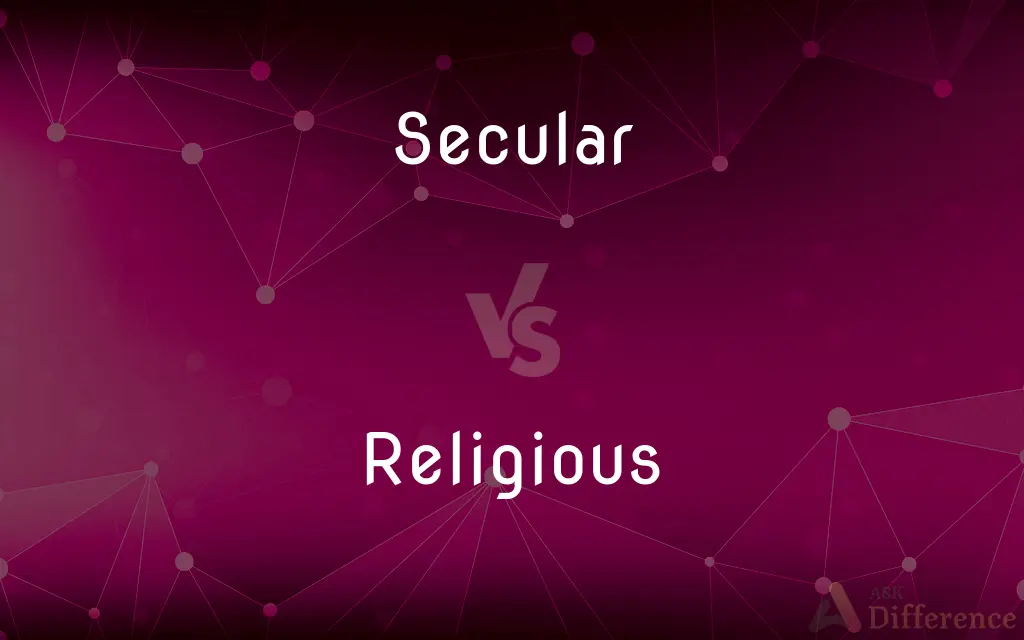Secular vs. Religious — What's the Difference?
Edited by Tayyaba Rehman — By Fiza Rafique — Updated on October 5, 2023
Secular pertains to non-religious matters or entities, while Religious relates to beliefs, practices, or institutions based on faith.

Difference Between Secular and Religious
Table of Contents
ADVERTISEMENT
Key Differences
Secular stems from the idea of separating worldly concerns from spiritual or religious matters. Its emphasis is on what can be observed, experienced, or validated without the intervention of religious principles. Religious, on the other hand, is grounded in spiritual beliefs and practices. It involves faith, devotion, and often adherence to a higher power or divine entity.
Secular institutions operate without the influence of religious dogma. They focus on societal governance based on human reasoning and consensus. Religious institutions revolve around worship, doctrines, and practices based on faith, and they offer moral and spiritual guidance to their followers.
A secular individual may not identify with any religious beliefs and might base life decisions on reason, personal experience, and societal norms. In contrast, a religious person's identity and choices are often intertwined with their faith, scriptures, and religious teachings.
Secular societies emphasize freedom of belief, aiming to ensure that governmental decisions are free from religious bias. This doesn't necessarily imply atheism but a distinction between governance and religious influence. Religious societies might shape laws and customs based on religious tenets, potentially influencing various aspects of daily life.
In secular cultures, art, literature, and celebrations might revolve around historical events, seasons, or human achievements. Religious cultures often express spirituality through religious festivals, rituals, and arts, commemorating events or figures from their sacred scriptures.
ADVERTISEMENT
Comparison Chart
Definition
Pertaining to worldly, non-religious matters.
Related to faith, worship, and divine belief.
Guidance Source
Human reasoning and consensus.
Scriptures, religious teachings, and spiritual leaders.
Role in Governance
Separation of state from religious institutions.
May involve religious influence on governance.
Festivities
Celebrations based on seasons, history.
Celebrations based on religious scriptures and beliefs.
Moral Source
Ethical standards based on societal norms.
Ethical standards based on religious scriptures and teachings.
Compare with Definitions
Secular
Not bound by religious rules or affiliated with any faith.
He attended a secular school with no religious teachings.
Religious
Fervently dedicated or devoted, often in a spiritual context.
Her religious dedication to the cause was admirable.
Secular
Concerning the worldly or temporal aspects of life.
Their celebration was secular, marking the changing of the seasons.
Religious
Pertaining to or based on faith, worship, or spiritual beliefs.
The festival had religious significance, marking a sacred event.
Secular
Distinct from religious, spiritual, or sacred matters.
The government made a secular decision, avoiding religious bias.
Religious
Originating from or associated with sacred scriptures or teachings.
The hymn had religious origins, drawn from ancient texts.
Secular
Neutral in terms of religious considerations or doctrines.
The law was framed in a secular manner to ensure fairness.
Religious
Deeply committed to religious values or doctrines.
He was a religious person, often visiting the temple.
Secular
Worldly rather than spiritual
The secular affairs of the parish.
Religious
Relating to or believing in a religion
Religious music
Both men were deeply religious and moralistic
Secular
Not relating to religion or to a religious body; nonreligious
Secular music.
Religious
A person bound by monastic vows.
Secular
Not bound by the full monastic rule of a religious order. Used of clergy.
Religious
Having or showing belief in and reverence for God or a deity.
Secular
Relating to or advocating secularism.
Religious
Of, concerned with, or teaching religion
A religious text.
Secular
Occurring or observed once in an age or century, as games in ancient Rome.
Religious
Extremely scrupulous or conscientious
Religious devotion to duty.
Secular
Lasting or persisting for a long time
A secular bear market.
Religious
A member of a monastic order, especially a nun or monk.
Secular
(Astronomy) Of or relating to characteristics of astronomical phenomena that change slowly over time.
Religious
Concerning religion.
It is the job of this court to rule on legal matters. We do not consider religious issues.
Secular
A member of the secular clergy.
Religious
Committed to the practice or adherence of religion.
I was much more religious as a teenager than I am now.
Secular
A layperson.
Religious
Highly dedicated, as one would be to a religion.
I'm a religious fan of college basketball.
Secular
Not specifically religious; lay or civil, as opposed to clerical.
Religious
A member of a religious order, i.e. a monk or nun.
Secular
Temporal; worldly, or otherwise not based on something timeless.
Religious
Of or pertaining to religion; concerned with religion; teaching, or setting forth, religion; set apart to religion; as, a religious society; a religious sect; a religious place; religious subjects, books, teachers, houses, wars.
Our law forbids at their religious ritesMy presence.
Secular
(Christianity) Not bound by the vows of a monastic order.
Secular clergy in Catholicism
Religious
Possessing, or conforming to, religion; pious; godly; as, a religious man, life, behavior, etc.
Men whose livesReligious titled them the sons of God.
Secular
Happening once in an age or century.
The secular games of ancient Rome were held to mark the end of a saeculum and the beginning of the next.
Religious
Scrupulously faithful or exact; strict.
Thus, Indianlike,Religious in my error, I adoreThe sun, that looks upon his worshiper.
Secular
Continuing over a long period of time, long-term.
The long-term growth in population and income accounts for most secular trends in economic phenomena.
On a secular basis
Religious
Belonging to a religious order; bound by vows.
One of them is religious.
Secular
(literary) Centuries-old, ancient.
Religious
A person bound by monastic vows, or sequestered from secular concern, and devoted to a life of piety and religion; a monk or friar; a nun.
Secular
Relating to long-term non-periodic irregularities, especially in planetary motion or magnetic field.
Religious
A member of a religious order who is bound by vows of poverty and chastity and obedience
Secular
(atomic physics) Unperturbed over time.
Religious
Concerned with sacred matters or religion or the church;
Religious texts
A nenber if a religious order
Lords temporal and spiritual
Spiritual leaders
Spiritual songs
Secular
A secular ecclesiastic, or one not bound by monastic rules.
Religious
Having or showing belief in and reverence for a deity;
A religious man
Religious attitude
Secular
A church official whose functions are confined to the vocal department of the choir.
Religious
Extremely scrupulous and conscientious;
Religious in observing the rules of health
Secular
A layman, as distinguished from a clergyman.
Religious
Relating to an organized system of faith and worship.
The painting depicted a religious ceremony from ancient times.
Secular
Coming or observed once in an age or a century.
The secular year was kept but once a century.
Secular
Pertaining to an age, or the progress of ages, or to a long period of time; accomplished in a long progress of time; as, secular inequality; the secular refrigeration of the globe.
Secular
Of or pertaining to this present world, or to things not spiritual or holy; relating to temporal as distinguished from eternal interests; not immediately or primarily respecting the soul, but the body; worldly.
New foes arise,Threatening to bind our souls with secular chains.
Secular
Not regular; not bound by monastic vows or rules; not confined to a monastery, or subject to the rules of a religious community; as, a secular priest.
He tried to enforce a stricter discipline and greater regard for morals, both in the religious orders and the secular clergy.
Secular
Belonging to the laity; lay; not clerical.
I speak of folk in secular estate.
Secular
A secular ecclesiastic, or one not bound by monastic rules.
Secular
A church official whose functions are confined to the vocal department of the choir.
Secular
A layman, as distinguished from a clergyman.
Secular
Concerning those not members of the clergy;
Set his collar in laic rather than clerical position
The lay ministry
The choir sings both sacred and secular music
Secular
Denoting attitudes or activities that have no religious basis.
She led a secular lifestyle, devoid of religious rituals.
Common Curiosities
Can someone be both secular and religious?
Yes, someone might live a secular public life but maintain personal religious beliefs.
What does it mean if a country is secular?
It means the country's governance is separate from religious influence.
Why might someone identify as religious?
Due to personal faith, upbringing, cultural context, or personal experiences.
How do secular views impact education?
Secular education emphasizes knowledge without religious bias, focusing on facts and reasoning.
Is secularism against religion?
No, secularism emphasizes the separation of state and religion, not opposition to religion.
Does secular mean atheist?
No, secular means non-religious, but doesn't necessarily imply disbelief in a deity.
Why is secularism important in diverse societies?
It ensures equal treatment and rights regardless of religious beliefs.
What roles do religious leaders play?
They offer spiritual guidance, interpret scriptures, and often lead religious ceremonies.
What's the importance of religious rituals?
They often symbolize beliefs, commemorate events, and strengthen communal bonds.
Can secular societies celebrate religious festivals?
Yes, they can participate culturally without religious adherence.
Can religious teachings influence ethics?
Yes, many derive their moral values from religious scriptures or teachings.
Can a secular person convert to a religion?
Yes, personal beliefs and experiences can change over time.
Are secular values universal?
While the principle of separating governance from religion is consistent, its application can vary across cultures.
How do religious traditions shape culture?
They influence art, festivals, customs, and sometimes even laws.
Do secular individuals believe in morality?
Yes, they often derive moral values from societal norms, personal beliefs, and reasoning.
Share Your Discovery

Previous Comparison
Floor vs. Pavement
Next Comparison
Todays vs. TodayAuthor Spotlight
Written by
Fiza RafiqueFiza Rafique is a skilled content writer at AskDifference.com, where she meticulously refines and enhances written pieces. Drawing from her vast editorial expertise, Fiza ensures clarity, accuracy, and precision in every article. Passionate about language, she continually seeks to elevate the quality of content for readers worldwide.
Edited by
Tayyaba RehmanTayyaba Rehman is a distinguished writer, currently serving as a primary contributor to askdifference.com. As a researcher in semantics and etymology, Tayyaba's passion for the complexity of languages and their distinctions has found a perfect home on the platform. Tayyaba delves into the intricacies of language, distinguishing between commonly confused words and phrases, thereby providing clarity for readers worldwide.















































